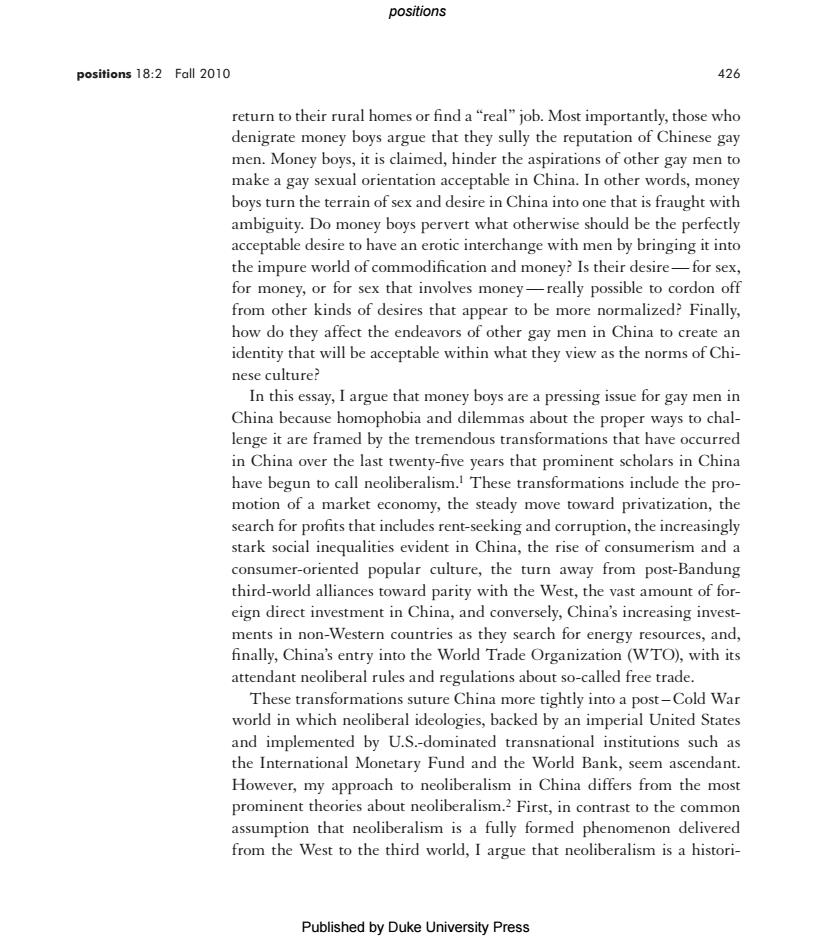正在加载图片...

positions positions 18:2 Fall 2010 426 return to their rural homes or find a"real"job.Most importantly,those who denigrate money boys argue that they sully the reputation of Chinese gay men.Money boys,it is claimed,hinder the aspirations of other gay men to make a gay sexual orientation acceptable in China.In other words,money boys turn the terrain of sex and desire in China into one that is fraught with ambiguity.Do money boys pervert what otherwise should be the perfectly acceptable desire to have an erotic interchange with men by bringing it into the impure world of commodification and money?Is their desire-for sex, for money,or for sex that involves money-really possible to cordon off from other kinds of desires that appear to be more normalized?Finally, how do they affect the endeavors of other gay men in China to create an identity that will be acceptable within what they view as the norms of Chi- nese culture? In this essay,I argue that money boys are a pressing issue for gay men in China because homophobia and dilemmas about the proper ways to chal- lenge it are framed by the tremendous transformations that have occurred in China over the last twenty-five years that prominent scholars in China have begun to call neoliberalism.These transformations include the pro- motion of a market economy,the steady move toward privatization,the search for profits that includes rent-seeking and corruption,the increasingly stark social inequalities evident in China,the rise of consumerism and a consumer-oriented popular culture,the turn away from post-Bandung third-world alliances toward parity with the West,the vast amount of for- eign direct investment in China,and conversely,China's increasing invest- ments in non-Western countries as they search for energy resources,and, finally,China's entry into the World Trade Organization(WTO),with its attendant neoliberal rules and regulations about so-called free trade. These transformations suture China more tightly into a post-Cold War world in which neoliberal ideologies,backed by an imperial United States and implemented by U.S.-dominated transnational institutions such as the International Monetary Fund and the World Bank,seem ascendant. However,my approach to neoliberalism in China differs from the most prominent theories about neoliberalism.2 First,in contrast to the common assumption that neoliberalism is a fully formed phenomenon delivered from the West to the third world,I argue that neoliberalism is a histori- Published by Duke University Presspositions 18:2 Fall 2010 426 return to their rural homes or find a “real” job. Most importantly, those who denigrate money boys argue that they sully the reputation of Chinese gay men. Money boys, it is claimed, hinder the aspirations of other gay men to make a gay sexual orientation acceptable in China. In other words, money boys turn the terrain of sex and desire in China into one that is fraught with ambiguity. Do money boys pervert what otherwise should be the perfectly acceptable desire to have an erotic interchange with men by bringing it into the impure world of commodification and money? Is their desire—for sex, for money, or for sex that involves money— really possible to cordon off from other kinds of desires that appear to be more normalized? Finally, how do they affect the endeavors of other gay men in China to create an identity that will be acceptable within what they view as the norms of Chinese culture? In this essay, I argue that money boys are a pressing issue for gay men in China because homophobia and dilemmas about the proper ways to challenge it are framed by the tremendous transformations that have occurred in China over the last twenty-five years that prominent scholars in China have begun to call neoliberalism.1 These transformations include the promotion of a market economy, the steady move toward privatization, the search for profits that includes rent-seeking and corruption, the increasingly stark social inequalities evident in China, the rise of consumerism and a consumer-oriented popular culture, the turn away from post-Bandung third-world alliances toward parity with the West, the vast amount of foreign direct investment in China, and conversely, China’s increasing investments in non-Western countries as they search for energy resources, and, finally, China’s entry into the World Trade Organization (WTO), with its attendant neoliberal rules and regulations about so-called free trade. These transformations suture China more tightly into a post –Cold War world in which neoliberal ideologies, backed by an imperial United States and implemented by U.S.-dominated transnational institutions such as the International Monetary Fund and the World Bank, seem ascendant. However, my approach to neoliberalism in China differs from the most prominent theories about neoliberalism.2 First, in contrast to the common assumption that neoliberalism is a fully formed phenomenon delivered from the West to the third world, I argue that neoliberalism is a historipositions Published by Duke University Press